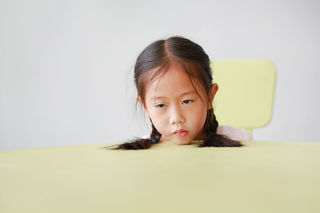Sleep
The Calmest Kid in Kindergarten Has Parents Who Ensure This
New research shows direct correlation between sleep and internalizing problems.
Posted March 16, 2020
When we think of kids with poor sleep, we think of a cranky, overstimulated, acting-out toddler. New research, published in the Journal of Child Psychology and Psychiatry, finds that this popular definition misses a much more serious sleep-related problem. Toddlers with poor sleep actually have increased internalizing problems, including anxiety, depression, and withdrawn behaviors. In addition, poor sleep in toddlerhood is associated with poor academic achievement and decreases in executive functioning skills.
The study analyzed sleep patterns and both teacher-reported rating scales, as well as objective measures of executive functioning and academic achievement. One hundred and nineteen children were followed and assessed at 30 months, 36 months, 42 months, and 54 months. Unlike most previous studies of child sleep, a parental report was not used to assess sleep. Instead, the children wore sleep monitors that measured movement at bedtime and during the night.
Due to the use of objective measures of sleep, self-regulation, and academic achievement, researchers were able to manage some of the observer bias that tends to plague sleep and early toddler research. Many previous studies of child sleep relied on parental report data of both sleep and emotional regulation. In addition, other sleep studies rely on teacher reports of child behavior, rather than more objective measures, such as the direct assessment of achievement and behavior.
What Type of Sleep Are We Talking About?
The researchers measured sleep in a few ways—they looked at sleep duration, bedtimes, the variability of bedtime from night to night, and activity during sleep. This is important because some of these factors can be manipulated—if variability is found to be a big problem, we can educate parents on the importance of a consistent bedtime. There are interventions that can keep children asleep for longer if frequent night waking is a problem. (For more about interventions that can promote longer and healthier sleep, click here.)

Findings:
Contrary to expectations, poor sleep was found to be much more predictive of internalizing problems than externalizing problems. Generally, parents tend to notice when their kids are cranky and irritable. Noticing withdrawal, depression, and anxiety in toddlers is a much more difficult task. (For more research on how sleep impacts anxiety in older children and adolescents, click here.)
In addition, poor sleep was associated with lower objectively measured achievement scores and less well-developed executive functioning skills.
Sleep variability and later bedtimes were associated with poor outcomes at 54 months.
Important Incidental Finding:
As part of the much larger data collection, the researchers compared parental estimation of children’s sleep to the actual sleep levels measured by the sleep trackers. They discovered that parents tend to overestimate sleep, not realizing either how long it takes children to fully fall asleep or periods of wakefulness during the night. This finding suggests that even if a parent thinks their child is getting enough sleep, that doesn’t necessarily mean that this is the case.
Limitations of the study:
The nature of the study—using actigraphy to objectively measure sleep—meant that children who were resistant to the sleep monitor, or those who interfered with it excessively, had to be excluded from the study. In addition, there were some missing data points due to the technological malfunction of the sleep monitor.
The study used a predominantly White, middle-class sample of toddlers. While the study did attempt to tease out some effects of socioeconomic status on sleep and adjustment, the sample wasn’t representative enough of lower socioeconomic status families to make any definitive statements. Replication with a more diverse population would provide more robust data.
Implications for Practice:
Toddlerhood is a crucial developmental window for developing social and emotional competencies. Even more than the actual academic skills taught in Pre-K and Kindergarten, the self-regulation foundations that allow kids to learn how to learn are set during this time period. Children are also developing their effortful control abilities, an important precursor to attention and academic functioning in grade school.
We tend to notice the externalizing kids in kindergarten. Those are the ones that tantrum, hurt other kids, and have a harder time controlling themselves. But the internalizers can be overlooked. We don’t always notice the withdrawn child, playing by himself, or the child whose depression doesn’t allow for normal childhood play. Because we don’t realize these children are suffering, we might miss an important target for intervention—educating their families about sleep.
The problem is, while these children are busy internalizing, their peers are developing all sorts of important self-regulation and academic competencies. They’re playing; they’re interacting; they’re learning problem-solving and critical thinking. But the internalizing kindergartener is missing out on many of those.
The more we learn about children and sleep, the more we realize how crucial it is for so many functions. During sleep, the prefrontal cortex undergoes synaptic pruning, which is an essential component of learning. The prefrontal cortex is the part of our brain that helps us engage in executive functioning, self-regulation skills, and attention processes. When children sleep, the prefrontal cortex refreshes itself. When this doesn’t happen, the major functions of kindergarten are not as well established.
We can’t control our children’s temperament. We don’t fully understand the bidirectional aspect of sleep disturbance in early childhood. Some children have rhythmic temperaments—their brains crave sleep at bedtime, they’re hungry at the same times each day, and they are generally predictable.
Other children tend to be arrhythmic. Some children have reactive temperaments—they are more difficult to soothe and more easily angered or frightened. We can’t control the genetic barriers to sleep for some children.
However, we can control parental attitudes about sleep. We can educate parents about the importance of sleep, even for quiet and withdrawn children. Since sleep variability and later bedtimes were correlated with a host of academic, executive, and self-regulation dysfunction, we can certainly recommend that parents emphasize age-appropriate bedtimes that don’t vary.
We can educate parents about all sorts of techniques that encourage sleep, even in active bedtime-resisters. (To read more, click here and here.) Let’s not be caught napping—let’s teach parents that sleep is the crucial feeder decision that enables all the other parenting outcomes. (To read more about feeder decisions, click here.)
© Robyn Koslowitz, 2020
References
Hoyniak, C.P., Bates, J.E., McQuillan, M.E., Staples, A.D., Petersen, I.T., Rudasill, K.M. and Molfese, V.J. (2020), Sleep across early childhood: implications for internalizing and externalizing problems, socioemotional skills, and cognitive and academic abilities in preschool. J Child Psychol Psychiatr.




